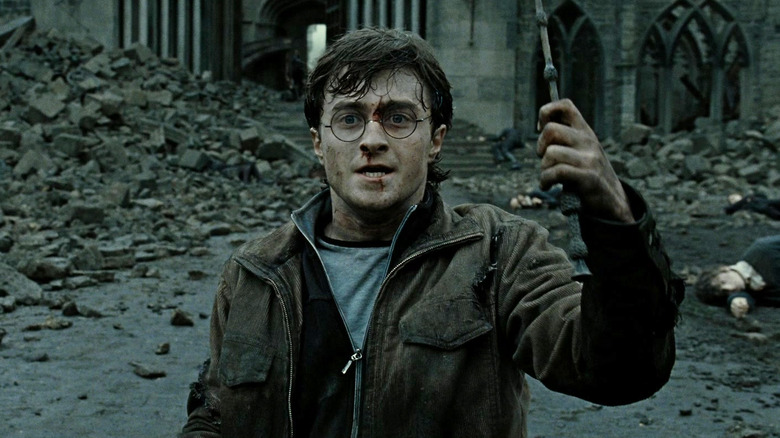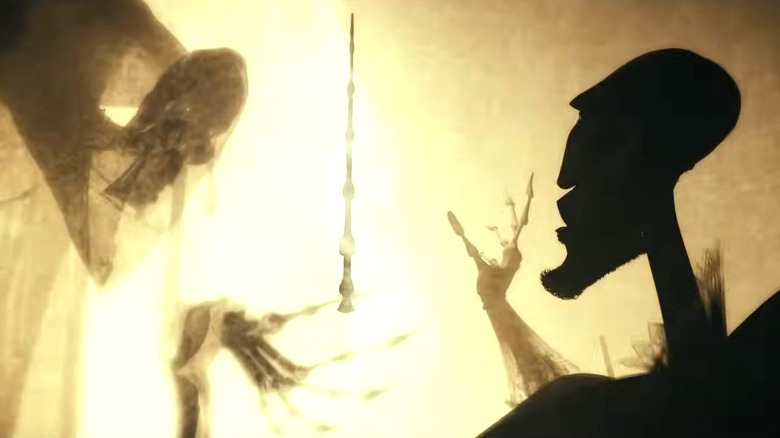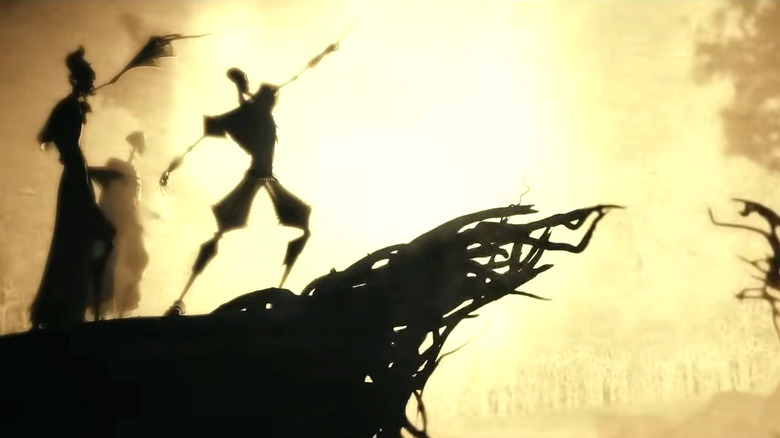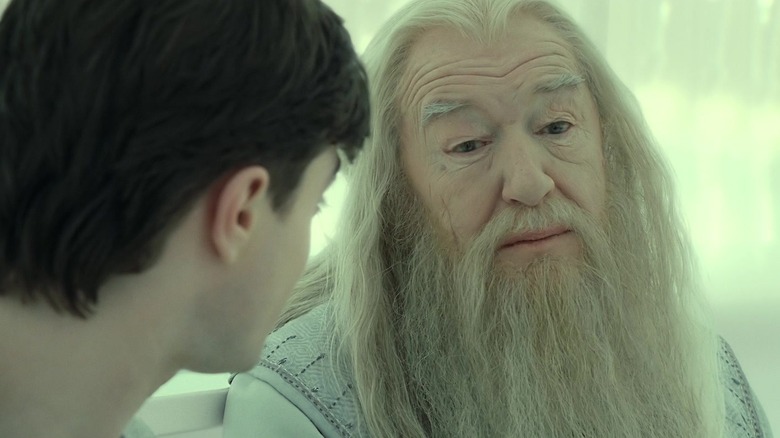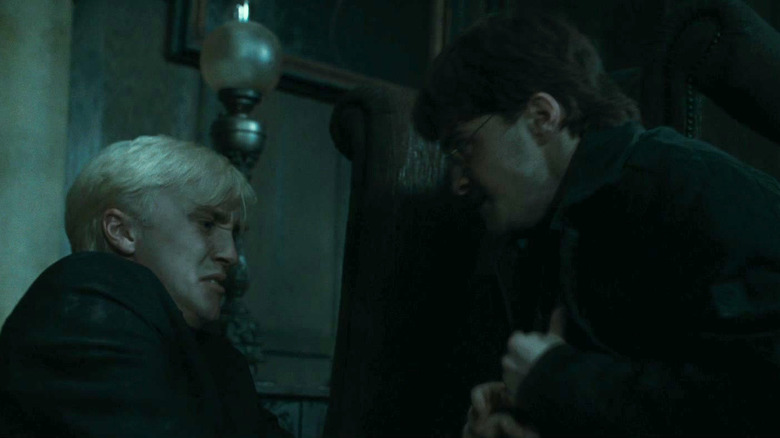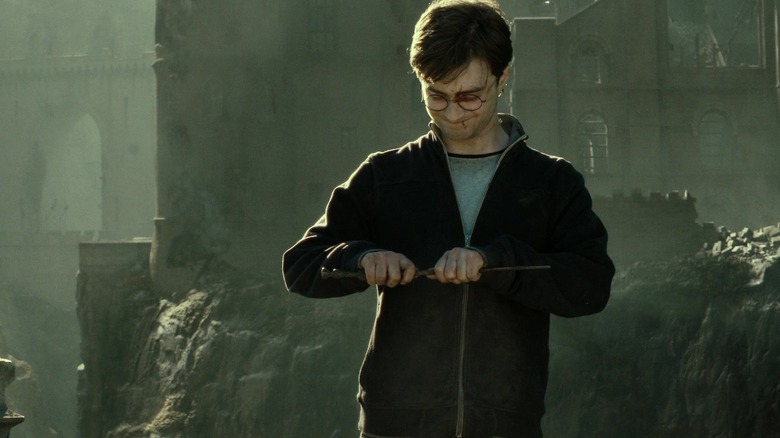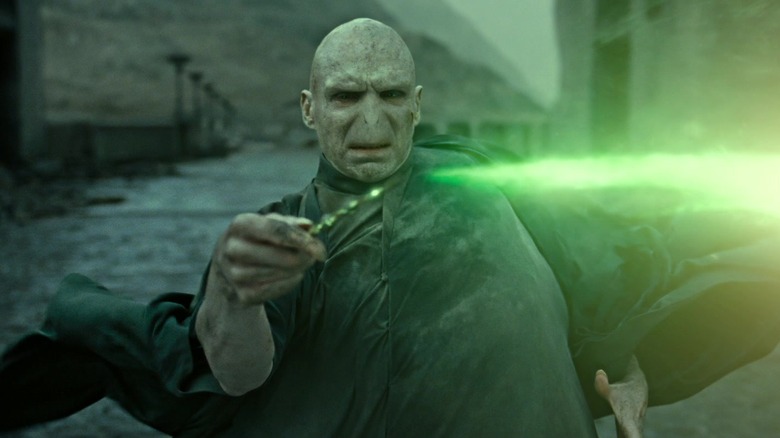Why The Elder Wand Is The Most Powerful Wand In The Harry Potter Universe
As good as the "Harry Potter" saga can be, it admittedly gets a little too complicated sometimes. Harry spends every year unraveling some sort of wild conspiracy, and because each installment needs to stretch this stuff out for an entire school year, these conspiracies have a ton of pieces that don't quite fit together. How was that giant basilisk crawling through the school pipes all year in "Harry Potter and the Chamber of Secrets," and why did Voldemort need Harry to go through that whole tri-wizard tournament just to trick him into touching a portkey in "Goblet of Fire?" There are answers to these questions, but they're not very satisfying.
The flimsiness in "Harry Potter" is often part of the fun. At least, it's easy to forgive, especially in the earlier entries when the franchise still has a childlike tone. It becomes a bigger issue, however, when the flimsiness factors into the property's big serious final showdown between Harry and Voldemort. In the climax of "Deathly Hallows," the fate of the entire world rests on the power of the mysterious Elder Wand, which operates under a logic so confusing and counter-intuitive that even the Machievalian Voldemort can't quite figure it out. It's a plot point some readers and viewers will similarly think back on years later and ask, "Wait, how exactly did that work?"
For the sake of any Potter fans who need a refresher on why the Elder Wand is so important and how it led to Voldemort's defeat, enjoy this handy guide.
Who created the Elder Wand and what makes it so powerful?
The exact origins of the Elder Wand are unknown. The closest thing we get to an answer is the story Harry, Ron, and Hermione read 400 pages into "Deathly Hallows," a children's book called "The Tale of The Three Brothers." There's a great amount of bickering amongst the trio over how much of the story should be taken as fact or fiction, which makes sense given that the book plays out like a standard kids' fable, with clear parallels to the tale of the Billy Goats Gruff (which was also the inspiration for Pennywise in "It"). There's definitely some grain of truth to the story though, because the section about the Elder Wand lines up perfectly with what we find out about it later.
The story establishes that the wand was created by Death himself, and it's unbeatable in a duel. However, because everyone loves the idea of an unbeatable wand, the Elder Wand's owners have a high likelihood of being murdered in their sleep and the wand getting stolen from them in the process. Xenophilius Lovegood (Luna Lovegood's annoying father) explains to a skeptical Hermione that the Elder Wand has been through a long chain of wizards throughout the centuries; eventually someone wizened up enough to not boast about their wand so no one would steal it from them, and soon the wand's exact whereabouts were lost to time.
Who is the original owner of the Elder Wand?
After some arguing with Hermione, Harry deduces that Voldemort is a distant descendant of the Peverell brothers, the youngest of whom's grave Harry finds at Godric's Hollow, marked with the sign of the deathly hallows. The brothers are named Antioch, Cadmus, and Ignotus, with the oldest brother Antioch being the one who asked Death for the Elder Wand.
Peverell is a distant relative not only of Voldemort, but of Harry himself. This is just one of many uncomfortable connections between the two enemies, but it doesn't factor much into how the Elder Wand storyline plays out. The wand, as we soon learn, doesn't care at all about ancestry; it's purely attracted to whoever disarmed its previous owner.
Of course, none of this is explicitly confirmed in the "Deathly Hallows" book or its movie adaptation. Likewise, it's never clarified exactly how much of this story really happened and how much of it was just a long-ago writer spinning his own fable for kids; all we know for certain is than an Elder Wand does exist, that it was created by some powerful force long ago, and that Voldemort wants it for himself.
How does Dumbledore possess the Elder Wand?
The "Death Hallows" book gives us a general idea of how the wand passed through owners over the centuries, albeit through the unreliable testimony of Mr. Lovegood. "Surely you have heard of the way the wand came to Egbert the Egregious, after his slaughter of Emeric the Evil?" he tells the trio. "Of how Godelot died in his own cellar after his son, Hereward, took the wand from him? Of the dreadful Loxias, who took the wand from Barnabas Deverill, whom he had killed? The bloody trail of the Elder Wand is splattered across the pages of Wizarding history."
Eventually, the wand found its way into the hands of wandmaker Mykew Gregorovitch, sometime in the late 19th/early 20th century. Gregorovitch was obsessed with trying to duplicate the wand's powers, and blabbed a bit too much about it while trying pull the feat off. This caught the attention of powerful dark wizard Gellert Grindelwald, who stole it from him without revealing his identity. Grindelwald then caused a whole bunch of trouble throughout the wizarding world — see the "Fantastic Beasts" movies for more details there — before his secret boyfriend Albus Dumbledore beat him in a duel.
The fact that Dumbledore could beat Grindelwald in a duel, despite Grindelwald canonically owning the most powerful wand in existence, is a testament to just how powerful a wizard Dumbledore is. It's also a testament to how powerful Voldemort is; he holds his own against Dumbledore in their "Order of the Phoenix" battle despite Dumbledore now possessing the Elder Wand himself.
Readers didn't know that Dumbledore possessed the Elder Wand until the end of "Deathly Hallows," where he explained the whole thing to Harry. "I was fit to own the Elder Wand, and not to boast of it, and not to kill with it," the now-deceased Dumbledore reveals. "I was permitted to tame and to use it, because I took it, not for gain, but to save others from it." It's a lesson that Harry would take to heart. But before he could do that he had to defeat Voldemort, who had taken the Elder Wand from Dumbledore's grave.
How does Harry Potter win the Elder Wand?
So, spoiler alert: Harry wins his battle with Voldemort at the end of "Deathly Hallows." That sure seems like it'd be impossible given that Voldemort has the Elder Wand, but it turns out there were a few complications Voldemort hadn't foreseen. The first mistake was that Voldemort assumed he'd become the Elder Wand's master simply by snagging it off of Dumbledore's corpse. He later realized this mistake and thus decided to kill Snape, the guy who murdered Dumbledore, believing that this is what would finally win him the wand's allegiance.
But it turns out that the wand doesn't really care about who killed who, as the children's story implies. The Elder Wand exclusively cares about whoever disarms its owner. Although Draco Malfoy chickened out and couldn't go through with killing Dumbledore in "Half-Blood Prince," he did unknowingly become the Elder Wand's master by disarming Dumbledore before Snape finished the job.
In turn, this allowed Harry to unwittingly become the Elder Wand's true master, because before his dual with Voldemort he had stolen Draco's wand for himself. This is where the mechanics of the Elder Wand's loyalty get iffy; not only did Harry not disarm Draco via magic spell — he just grabs it out of his hands — but the wand he took was Draco's regular wand. Nevertheless, the Elder Wand recognized and respected this change of ownership; even though it wasn't the Elder Wand itself Harry took from Draco, disarming the wand's owner to any extent was enough for Harry to shift the Elder Wand's loyalty.
When Voldemort cast his avada kedavra spell at Harry, the Elder Wand recognized that it was being used against its true master, so it chose to backfire against Voldemort, killing him instead. And so Harry ends the series with ownership of the Elder Wand, which he alone is the master of.
What happens to the Elder Wand in Harry Potter and the Deathly Hallows?
In the "Deathly Hallows" book, Harry uses the Elder Wand to fix his original wand, and then vows to put the wand back in Dumbledore's grave. "I'm putting the Elder Wand back where it came from," he says. "It can stay there. If I die a natural death like Ignotus, its power will be broken, won't it? The previous master will never have been defeated. That'll be the end of it."
We don't know everything that happens in Harry's life from that point on, but do we know he happily survives for at least another 19 years without anyone disarming him. The Elder Wand's power isn't broken yet, but there's plenty of hope that Harry's on track to break the cycle.
In the second "Deathly Hallows" movie, meanwhile, Harry just snaps the wand in half. It's a real "Wait, he can do that?" sort of moment, one that's caught a lot of flak from book fans. I for one am almost completely fine with the decision — him breaking the wand is the more cinematic choice, and it gets to the point a lot quicker than Harry's diplomatic approach in the book — but the nitpicker inside me still hates how he doesn't use the Elder Wand to fix his original wand first. Now poor Harry has to go back to Ollivander's and settle for a second-best wand instead, assuming Ollivander even still runs the place after his year of torture and imprisonment. At the very least, Harry could've used the wand to help repair Hogwarts a little, instead of leaving the job to poor Filch.
How do fans feel about the Elder Wand storyline?
Although the general storyline around the deathly hallows is pretty iconic at this point — I'll still see people with deathly hallow tattoos or bumper stickers — it's also the source of a lot of fandom controversy. The sore spot for some fans is how complicated and technical it all is; Harry doesn't win in the end because he grew as a character, he wins because nobody else bothered to read the Elder Wand's terms and conditions page. Harry winning because of a disarming technicality feels like a bit of a cheat.
To be fair, the rules were reasonably well-established pre-reveal; the backstory of how Grindelwald and Dumbledore claimed the wand (neither cases involving the murder of the original owner) helped to clue Harry in on the mistake of thinking Voldemort killing Snape would win him the wand's allegiance. It's also worth noting that the real reason Harry was able to defeat Voldemort was that, prior to the Elder Wand reveal, he was selfless enough to sacrifice his life to save his friends, something Voldemort himself would never do. It was that noble choice that not only destroyed the final horcrux (Harry himself), but which gave Harry the final clues he needed to realize he was the Elder Wand's true master.
So sure, the Elder Wand rule book is a bit convoluted, but Harry's path to victory mostly stayed true to the property's long-running themes about the importance of friendship and bravery in the face of evil. There's plenty to nitpick about the finale of the "Harry Potter" saga, but in light of recent controversial endings to long-running fantasy series, it sure could've been a lot worse.
